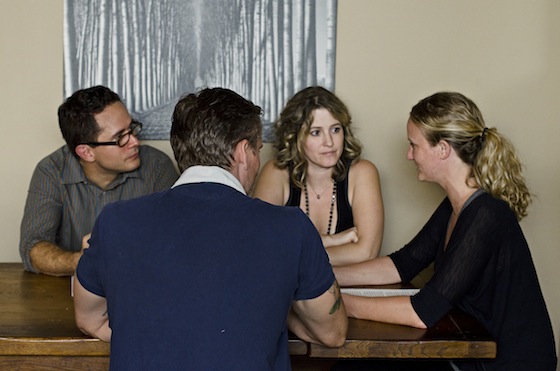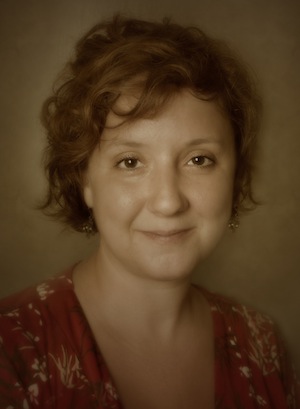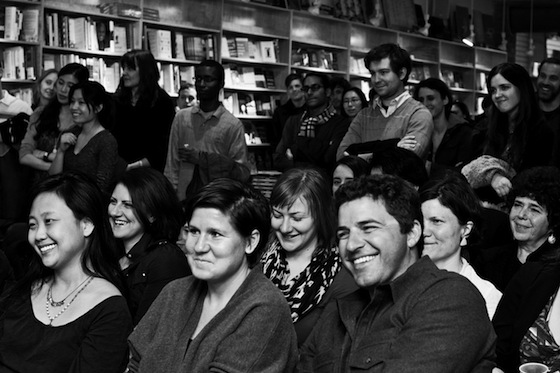

A Sackett Street class being led by instructor Heather O’Neill (far right) at her home in Carroll Gardens.
Two years before her name started making regular appearances in glossies from Oprah to Entertainment Weekly—back before Flavorwire named her one of New York’s 100 most influential living writers—Emma Straub, author of Laura Lamont’s Life in Pictures, baked me oatmeal cookies. We ate them sitting around a low-slung coffee table in her father Peter Straub’s gracious Upper West Side townhouse while discussing the narrative merits of Twilight with five other writers. Opinions varied, but everyone agreed that the cookies were excellent. Straub was delighted. It was her first evening teaching for Brooklyn’s Sackett Street Writers’ Workshop and she wanted us to feel at home. The fact that I actually did surprised me—and not just because I happened to be sitting in the den of one of America’s foremost horror writers. What really surprised me was the idea that a workshop could be so damn pleasant.
There are writers born ready to stake their claim to the world of letters and others with the brass balls necessary to gut it out in a vacuum until their moment finally arrives. I happen not to be either. Consequently, I’ve spent a good chunk of my adult life paying others to browbeat me into writing. There’s a special name for this stripe of motivation: it’s called workshopping and those familiar with the process know just how harrowing it can be. That writers are an insecure bunch is widely acknowledged. What often goes unsaid is just how rabidly critical they can be. Get a bunch of writers in a room with a mandate to pull each other’s work apart and, likelier than not, there will be causalities.

Julia Fierro, novelist, editor, and the founder and director of The Sackett Street Writers’ Workshop
I’ve heard some argue that the mark of a true fiction writer is the ability to keep going in the face of this sort of psychic pummeling, but really, why should anyone have to? This was the question that novelist Julia Fierro posed to herself when she first contemplated starting her own writers’ workshop. During her time at the Iowa Writers’ Workshop, Fierro had the opportunity to study with master teachers like Ethan Canin, who managed to extract the bile from the process. The key, she came to understand, was to keep the focus on craft.
“Almost everything people react to in a story comes down to an issue of craft,” Fierro told me in a recent phone call. “If someone says they hate a particular character, they’re usually talking about an issue with tone. The trick to keeping things constructive is giving students the language to articulate what’s not working at a craft level. This is what actually helps writers get better.”
The first ever Sackett Street Writers’ Workshop took place around a beat-up kitchen table in Fierro’s third floor walk-up in Carroll Gardens. There were eight writers in all, culled from the stacks of applications she received in response to an ad posted on Craigslist. Believing firmly that a good writer is a good reader first, Fierro supplied her students with a bibliography of books she felt to be benchmarks of craft. They were instructed to treat these stories like roadmaps. Rather than trying to root out students’ weaknesses, Fierro concentrated on nurturing their strengths and deepening their understanding of what constitutes truly great writing. Each week, while discussing one another’s work, students were asked to focus first on what aspects of craft the writer was deploying successfully. At the end of the evening, people walked out of her apartment armed with new tools. Unsurprisingly, this first workshop spawned another and another and then another until it became clear that demand was outstripping supply. This presented Fierro with yet another opportunity to help writers: by hiring them.
Over the past 10 years, Sackett Street has employed more than 50 instructors. Writing is a notoriously low-to-no paying profession and teaching gigs are in high demand—particularly gigs that can be conducted from the comfort of your own garret. To help maintain the supportive tenor of the workshops, Fierro asks that instructors rely on her workshopping guidelines, but she places just as much faith in her instructors as she does her writers. “It’s the workshop leader’s job to make sure the environment stays intimate and friendly and not catty and negative,” says Straub. Handpicked by Fierro, most Sackett instructors are successful at this. Those who aren’t are quickly weeded out.

As part of the ongoing Sackett Street Writers’ Reading Series at BookCourt, they celebrated their 10th anniversary last year with a reading and party.
In addition to the freedom given to instructors, Sackett offers other perks. Fierro is a tireless social media maven, beloved by Sackett teachers, students and friends for her willingness to sound the bullhorn on behalf of their work. If you want a crash course on Brooklyn’s literary ecosystem, spend some time on Fierro’s Facebook page, it’s all there. All of these things have contributed to making Sackett a clearinghouse for young literary talent. Read a review of a debut novel in The New York Times Book Review these days and the author is likely to teach at Sackett. In addition to Straub, Fierro’s recent roster of teachers has included Benjamin Hale, Alison Espach and Ayana Mathis, whose book The Twelve Tribes of Hattie was just named an Oprah Book Club pick.
Like Straub’s workshop, most Sackett classes are unusually intimate, with no more than eight students gathering in homes rather than in lecture halls. For a certain breed of book dork like me, this close proximity to critically acclaimed writers is in itself thrilling enough to justify the entry fee. Those who truly revere books often have a difficult time imagining themselves in the same category as the writers they admire and being in the company of authors who’ve achieved what you have only dreamed of can be liberating. When faced with these people you quickly see that they are just that–people. Talented people, yes, but also hard working and willing to risk failure. It also quickly rids you of any delusions of grandeur. The lives of most of the Sackett Street instructors I encountered were remarkably free of pretension. These people aren’t in it for the glory, but for the love of the game.
To get a sense of how successful Fierro has been in realizing her vision of a kinder, gentler workshop framework, you need only scan online reviews by former students. “I’ve taken six Sackett classes,” wrote one commenter on the Creative Writing MFA Blog. “Yes, six. Although I already had an MFA, the Sackett approach was unique in its combination of rigor *and* support–that is, extremely close reading and intelligent examination of craft, but no mean-spiritedness.”
Having taken five Sackett Street courses myself, I can only echo the commenter’s thoughts. Under the careful ministrations of teachers like Straub, I produced more fiction in two years than I had in my previous twenty. My critical habits developed even as the scathing voice in my head died away. I began to see what I was good at and where I might hope to advance. Not everything I wrote succeeded, but I came to see the bad as a stepping stone instead of as a roadblock. Fierro’s philosophy deserves much of the credit for this. Sackett’s emphasis on craft puts the power in the hands of the writer. In Fierro’s universe, you don’t have to be born extraordinary to earn the label writer, you just need to write, and write, and keep on writing. Thanks to Sackett Street, for the first time in my life I can, in good conscience, call myself a fiction writer.


What coincidence! I was at this very moment putting what I hope is the final edit on a story birthed in a SSWW workshop. It is all you say plus oh so much more and I was a lucky girl to find them.